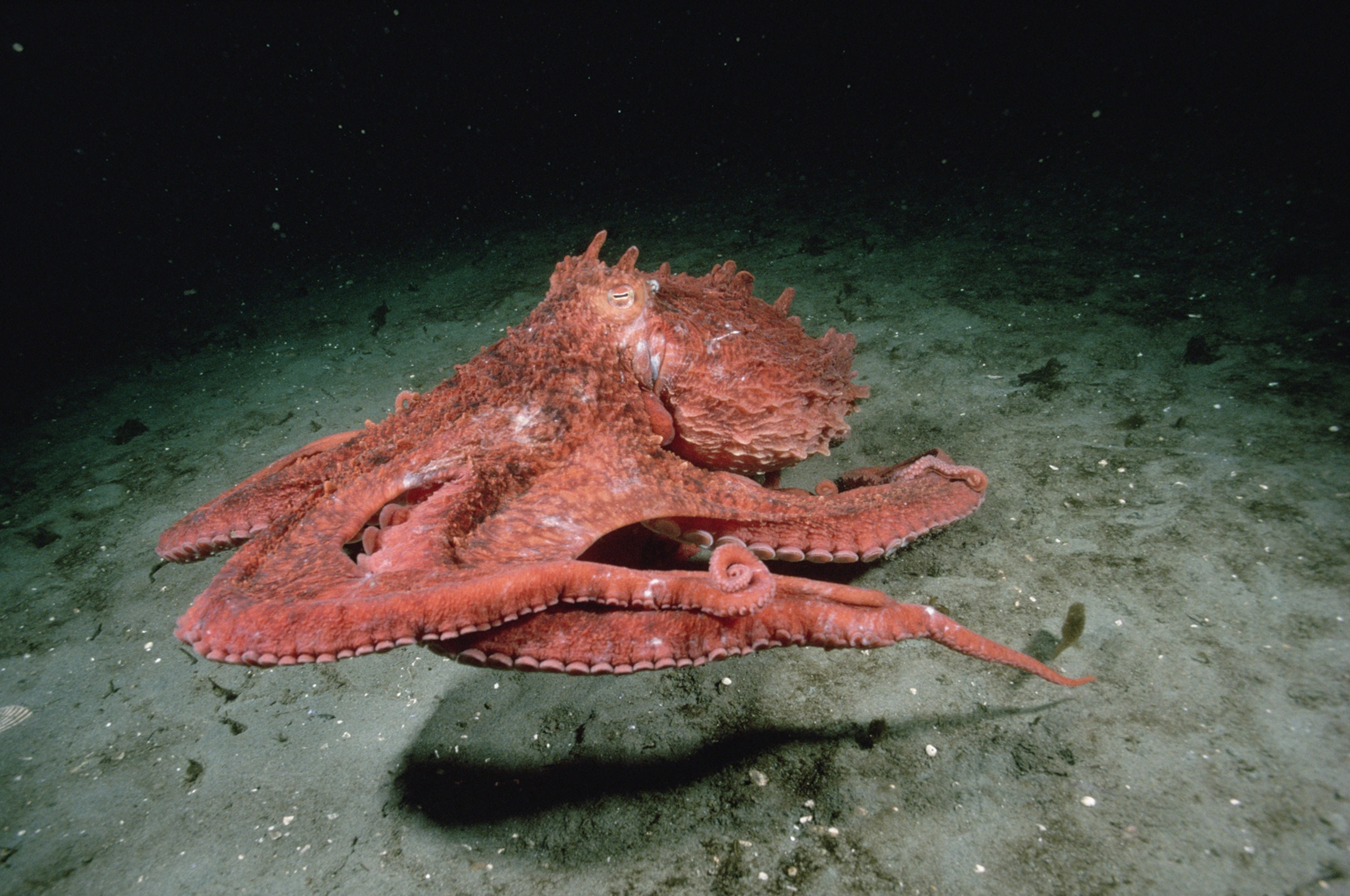
Giant octopuses are fascinating creatures that capture the imagination with their intelligence and unique adaptations. These marine animals belong to the Octopoda order and have captivated scientists and the general public for centuries. With their impressive size, reaching lengths of up to 30 feet and weighing over 600 pounds, giant octopuses are true marvels of the deep sea.
In this article, we will dive into 18 intriguing facts about giant octopuses, exploring their habitat, behavior, and incredible abilities. From their remarkable camouflage and problem-solving skills to their impressive hunting techniques, these creatures have earned their place as one of the most captivating animals in the ocean.
So, prepare to be amazed as we shine a spotlight on these extraordinary cephalopods and uncover some of the most fascinating details about giant octopuses.
Key Takeaways:
- Giant octopuses are the largest of their kind, with three hearts, incredible camouflage skills, and the ability to regrow lost limbs. Their intelligence and strength make them truly fascinating creatures of the sea!
- These solitary creatures possess remarkable problem-solving abilities, keen senses, and even use tools. Their rapid growth, complex nervous system, and amazing agility make giant octopuses a marvel of the animal kingdom!
The giant octopus is the largest known species of octopus.
With an average weight of around 22 pounds and a length of 14 feet, the giant octopus is truly a giant among its relatives. Its size allows it to dominate its environment and fend off potential predators.
Giant octopuses have three hearts.
Yes, you read that right! These remarkable creatures have not one or two, but three hearts. Two of their hearts pump blood to the gills, while the third circulates blood throughout the body.
They are masters of disguise.
The giant octopus possesses mesmerizing camouflage skills, enabling it to blend seamlessly with its surroundings. It can change its skin color, texture, and even shape to mimic various objects or creatures, providing an effective defense against predators.
Giant octopuses have powerful beaks.
These creatures have incredibly strong beaks that can easily break through the shells of their prey. They primarily feed on crabs, mollusks, and small fish.
They are highly intelligent.
Giant octopuses are known for their exceptional problem-solving abilities and curiosity. They have been observed exhibiting complex behaviors, such as opening jars, solving puzzles, and even escaping from tanks!
They have a relatively short lifespan.
Despite their incredible size and intelligence, giant octopuses have a relatively short lifespan of around 3 to 5 years. During their short lives, they devote themselves to reproduction and ensuring the survival of their offspring.
Giant octopuses are solitary creatures.
Unlike many other species of octopuses, giants are primarily solitary creatures and prefer to roam and hunt alone. They only come together during the breeding season.
They have excellent eyesight.
The giant octopus has highly developed eyes, allowing it to see clearly in both dimly lit and bright environments. Their exceptional vision helps them spot prey and detect potential threats.
These creatures possess incredible strength.
Despite their soft bodies, giant octopuses are surprisingly strong. Their tentacles are equipped with powerful suction cups that allow them to grip and manipulate objects with ease.
Giant octopuses can regrow lost limbs.
If a giant octopus loses one of its limbs due to an injury or during a confrontation, it has the remarkable ability to regenerate the lost limb over time.
They prefer a solitary lifestyle.
Giant octopuses are known for being territorial and prefer to live alone. Each individual has its own selected den, where it can retreat and feel secure.
Giant octopuses communicate using a fascinating repertoire of signals.
These intelligent creatures communicate with each other using various signals, including changes in body color, patterns, and postures. Each signal conveys specific information.
They are known to exhibit complex problem-solving skills.
Giant octopuses have been observed in captivity solving elaborate puzzles and even opening jars to access hidden food rewards. Their problem-solving abilities showcase their high level of intelligence.
Giant octopuses have a keen sense of touch.
With hundreds of suction cups on their tentacles, giant octopuses have an incredible sense of touch. They can detect subtle changes in their environment and use their tentacles to explore and manipulate objects.
They are capable of rapid growth.
Youthful giant octopuses grow at an astonishing rate, sometimes increasing their body weight by 5% per day. This rapid growth helps them reach their impressive adult size in a relatively short period.
Giant octopuses have a complex nervous system.
These remarkable creatures have highly advanced nervous systems, with nearly two-thirds of their neurons located in their arms. This unique feature enables them to coordinate complex movements and actions.
They can use tools.
Giant octopuses have demonstrated the ability to use tools in captivity. They have been observed collecting coconut shells to create shelter or using rocks to create barriers for protection.
Giant octopuses are capable of amazing feats of strength and agility.
These incredible creatures can squeeze through tiny gaps and even manipulate objects with their tentacles that have a mind-boggling level of dexterity. They are truly awe-inspiring to watch.
The giant octopus is a fascinating creature that showcases the wonders of nature. Its ability to camouflage, problem-solve, and adapt to its surroundings is truly remarkable. With its intelligence, strength, and captivating behavior, the giant octopus continues to capture the imagination of marine enthusiasts and researchers alike.
Throughout this article, we have explored the 18 incredible facts about the giant octopus that make it one of the most intriguing creatures in the animal kingdom. From their massive size and intelligence to their astonishing abilities, these creatures leave us in awe of their magnificence. So, the next time you catch a glimpse of these creatures in documentaries or at an aquarium, remember the amazing facts that make the giant octopus so special!
Conclusion
In conclusion, the giant octopus is truly an incredible creature with a fascinating array of facts and abilities. From its size and intelligence to its unique camouflage and hunting strategies, the giant octopus continues to capture the curiosity of scientists and nature enthusiasts alike. Whether you’re amazed by its ability to squeeze through tight spaces or its remarkable problem-solving skills, the giant octopus serves as a reminder of the incredible diversity and beauty of the animal kingdom. So next time you marvel at these magnificent creatures, take a moment to appreciate just how remarkable they truly are.
FAQs
1. How big can a giant octopus get?
The giant octopus is the largest species of octopus in the world and can grow up to 16 feet in length and weigh over 100 pounds.
2. How do giant octopuses change color?
Giant octopuses have specialized skin cells called chromatophores that contain pigments and can expand or contract to create different colors and patterns, allowing them to camouflage and blend into their surroundings.
3. What do giant octopuses eat?
Giant octopuses are carnivorous and primarily feed on crabs, lobsters, fish, and other small marine animals. They are highly skilled hunters and can even capture prey larger than themselves.
4. How do giant octopuses reproduce?
Male giant octopuses have a specialized arm called a hectocotylus that they use to transfer sperm packets to the female during mating. The female then lays thousands of eggs, which she carefully guards and aerates until they hatch.
5. Are giant octopuses dangerous to humans?
While giant octopuses are generally not considered a threat to humans, they do possess a powerful beak and can deliver a painful bite if provoked. It’s always important to respect their space and observe them from a safe distance.
6. How intelligent are giant octopuses?
Giant octopuses are known for their high level of intelligence, problem-solving abilities, and excellent memory. They have been observed using tools, solving puzzles, and even learning from observation.
7. Where can giant octopuses be found?
Giant octopuses are found in various oceans around the world, including the Pacific, Atlantic, and Indian Oceans. They typically reside in deep-sea areas, rocky reefs, and kelp forests.
Dive deeper into fascinating creatures and thrilling adventures! Uncover the secrets of fierce alien hunters in our exploration of the iconic "Predator" movie franchise. Journey beneath waves to meet SpongeBob's grumpy neighbor, Squidward, whose tentacles hold surprising talents. Finally, discover nature's masters of disguise as we reveal mind-boggling facts about camouflage in the animal kingdom. Which captivating topic will you explore next?
Was this page helpful?
Our commitment to delivering trustworthy and engaging content is at the heart of what we do. Each fact on our site is contributed by real users like you, bringing a wealth of diverse insights and information. To ensure the highest standards of accuracy and reliability, our dedicated editors meticulously review each submission. This process guarantees that the facts we share are not only fascinating but also credible. Trust in our commitment to quality and authenticity as you explore and learn with us.


